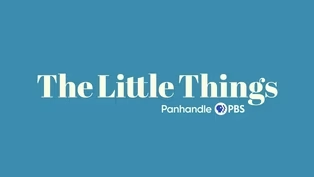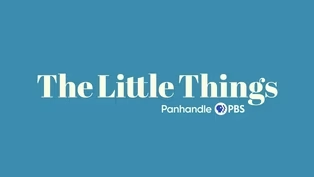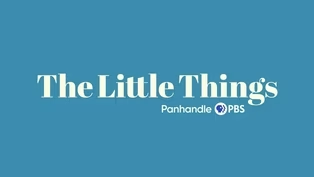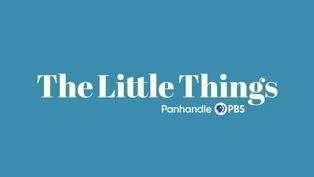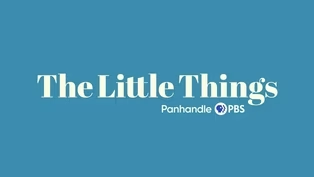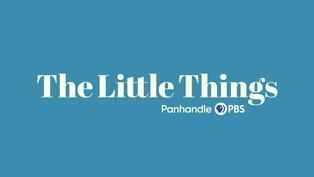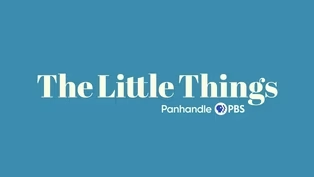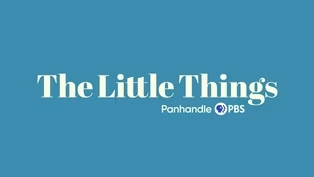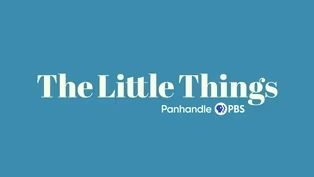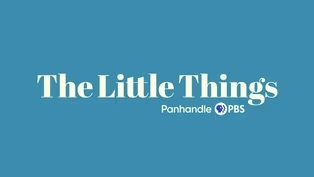The Little Things
Episode 8 – Getting Better
11/3/2022 | 28m 4sVideo has Closed Captions
Texas Panhandle organizations respond to fill gaps in mental healthcare for our community.
Texas Panhandle organizations respond to fill gaps in mental healthcare for our community.
Problems playing video? | Closed Captioning Feedback
Problems playing video? | Closed Captioning Feedback
The Little Things is a local public television program presented by Panhandle PBS
The Little Things
Episode 8 – Getting Better
11/3/2022 | 28m 4sVideo has Closed Captions
Texas Panhandle organizations respond to fill gaps in mental healthcare for our community.
Problems playing video? | Closed Captioning Feedback
How to Watch The Little Things
The Little Things is available to stream on pbs.org and the free PBS App, available on iPhone, Apple TV, Android TV, Android smartphones, Amazon Fire TV, Amazon Fire Tablet, Roku, Samsung Smart TV, and Vizio.
Providing Support for PBS.org
Learn Moreabout PBS online sponsorship- [Speaker] If you are someone you know is in crisis, help is available.
Call or text 9-8-8 to be connected to trained counselors from the National Suicide Prevention Lifeline.
Free and confidential support is available 24 hours a day, seven days a week in the United States.
If it is an emergency, please call 9-1-1.
For more information, visit suicidepreventionlifeline.org.
(heartfelt music) - [Narrator] More people around the globe Googled how to maintain mental health in 2021 than ever before.
Between the pandemic, politics, and personal matters, we're stressed out.
The whole planet is stressed out.
We asked local and national experts for their advice and the research behind it.
Breathing intentionally, being mindful, exercise, connection, creativity.
Those aren't just buzzwords.
They're science-based strategies to help us build resilience.
Sometimes the little things can make a big impact.
(heartfelt music) - This is Buddy.
He's one of our equine horses that we use in equine therapy.
- [Narrator] Because they are prey animals, horses must be hyper alert in the wild, making them ideal to use in physical and mental health therapy.
- They're always aware of their surroundings, so when you get within about 20 foot of them, they can feel your energy.
Whether it be depression, anxiety, frustration, they can feel it.
So when we have a client that is feeling frustration, we teach them to watch and see that in the horse, 'cause the horse can feel it before the client even knows they're feeling it.
So it's good for them to be able to see it and learn to see it in the horse before they even feel it 'cause they can stop and say, "Okay, this horse stopped working with me.
What am I feeling?
Okay, maybe I'm feeling frustrated or anxious.
What do I need to change to get him to work with me again?"
They end up recognizing it and being able to change it before it becomes unmanageable.
- [Narrator] Buddy and Lou Ann showcased equine therapy at Garden of the Mind, a September event hosted by Panhandle PBS at Amarillo College.
Presented in partnership with Panhandle Behavioral Health Alliance and Texas Panhandle Centers, Garden of the Mind emphasized the healing powers of mindfulness, exercise, a good diet, creativity, nature, and connection.
- I've been wanting to kind of get into yoga and just overall just personal growth.
- I've never had taken breaths like that.
(heartfelt music) And it just brought a lot of energy and good vibes to my body that I've never even felt that I could do.
- You know, there's so many people nowadays that offer that, you don't know who to go to.
- You know, it just made me feel like a whole new person.
- I don't know, I feel better or peaceful, I guess, so it's something that I want to continue doing.
- [Narrator] Emily Guerrero tried creative activities at Garden of the Mind.
- Art is very therapeutic for me, and I think people have a misconception that to feel better you have to go to therapy, but there's other alternatives like art, where it's just creativity, and that really just helps you mentally, too.
I mean, there's no boundaries to art.
It's just purely your imagination, so you can make and create anything you want.
It's just freedom.
- [Narrator] Daniel Tiger also visited Garden of the Mind.
Originally a character from "Mister Rogers' Neighborhood", Daniel Tiger has his own educational PBS series and is known for helping children learn to be resilient.
- My kiddo learned so many aspects to control their emotions.
My little girl, she struggles language and social a little bit, and she easily cry sometimes.
And she learn from Daniel the Tiger how to control and take a deep breath.
And nowadays she starts, like, oh, take a deep breath.
So she practice without me teaching her, so actually she picks up the stuff from that show.
- [Narrator] Numerous individuals and community groups provided activities and information like the tips in this series.
- I didn't realize just how many there were and just how open everyone is.
I mean, there's just a lot of people that care here.
(heartfelt music) - We were 50th out of 50 states in the state of Texas at one point because of our approach for mental health care.
And a statistic like that, and the other things that I've learned, what I realized is that this is a real problem and this is the time for us to get it together and have that conversation and do something about it.
I am the founder of the Panhandle Behavioral Health Alliance, I'm a board member of the Meadows Mental Health Policy Institute, and a nurse practitioner physical therapist in my career.
The alliance is a neutral place for everyone who has anything to do with mental health and addiction to come to together and have a conversation about how we approach those challenges and how do we approach treatment, because it's so fragmented.
- So we are a community collaboration made up of providers, local leaders, and individuals and family members that come together to see how we can improve access to care in our community.
- Meadows had a conference here in the beginning, so six years ago now, maybe five years ago, called Texas State of Mind here in Amarillo just to get us started on our conversation, and invited everyone who had anything to do with mental health care, including the justice system, the city of Amarillo, providers, city leaders.
And it turned out to be true as to what we thought, and that is that everybody that has anything to do with mental healthcare and addiction is in a silo with their resources and what they do.
- Well, one of the things that kept cropping up since the very beginning has been a need for individuals or for providers, whether it's the medical community or a service provider, to know who does what in terms of mental health and behavior health in the community.
So that led us to investing in the Panhandle Mental Health Guide.
It's an online resource directory.
You just type in panhandlementalhealthguide.org and it'll take you there.
You can search by keyword or by categories and such.
But the nice thing about it is that there's also a library of articles and videos that you can research so that you can understand a little bit more about what's going on.
(uplifting music) - [Narrator] Two areas of focus for the alliance are educating the community about prevention, early intervention, and available services, and addressing mental health care provider shortages.
- We also do a learning community for providers in terms of integrating behavioral health into primary care.
- Someday we would like to be where mental health, mental illness, and addiction is treated like diabetes and heart disease.
- Last but not least is our justice-involved population, because when we are not getting timely services and there's a huge stigma around reaching out for services, then you're ending up having altercations with the law or ending up in the jail, and your illness is being criminalized as opposed to being treated.
- We know now from research that if we can intervene in mental health care and addiction early, we have a much better chance of taking care of it so that there's not problems later.
So to me, the crisis is not taking care of those problems.
(heartfelt music) - The Meadows Mental Health Policy Institute, they did some research specifically on the Panhandle for us, and of, I think, the 75,000 adults and then the 30,000 adolescents that are suffering with mental health issues, that 80% of those can be treated in the primary care setting.
We have to stop treating the brain and the body as two separate entities.
They are one.
And so when you go to the doctor, they should be asking you about your mental health just like they check your thyroid or if you have diabetes, they check your A1C.
- [Narrator] So the Amarillo Area Foundation is helping to fund a Meadows Mental Health Policy Institute effort to increase integrated health.
- Really what it is, is it's the institute working with three of our local health providers and they're setting up those primary care docs with universal screenings, so mental health assessments and screenings, the billing for that, because that has to be sustainable for our providers to be able to continue to do that, and in-house referral.
So immediately from that primary care visit, there is somebody in-house, a community worker who is working to assess that referral, get you plugged in, maybe it's telehealth, maybe it's with another counselor, maybe it's a medication.
So really that seamless pass off from "we identified this and we're gonna treat it," and it's universal.
So every single time you go to your primary care doctor, they're gonna be asking that.
And then our hope is we'll be able to expand that into some rural partners as well.
Our next focus is how do we provide more mental health workers, LPCs, counselors, licensed social workers, whoever that might be?
You know, our area, the whole Panhandle is a mental health provider shortage area, and most of the state is, to be real honest.
I think the conversation we've heard is how do we grow our own?
So how do we, one, entice people to go into that work, and how do we keep them here?
- [Narrator] Texas Panhandle Centers for Behavioral and Developmental Health also is working to integrate physical and mental health care across the Texas Panhandle.
- It's all about holistic care for the people that we see and the people that we serve.
They're not just someone with a mental health diagnosis, they're not just someone with a physical disease, and everything interrelates and one thing affects another.
- We know that those of us, myself included, with a psychiatric diagnosis, we die 15 to 20 years earlier on average than the general population, and we die from chronic, treatable conditions, things that can be resolved or treated.
- We're able to go out to all these little tiny towns like Memphis and Wellington and things like that, and we have a whole team where we can go out and see them and meet them where they are.
And we're able to provide integrative care with meeting their mental healthcare needs, but as well as screening for physical healthcare issues, and we go from there.
- [Narrator] A new mobile wellness clinic adds to TPC's capabilities.
- So we typically have our whole team out there.
So that's a team of case managers.
We have a nurse practitioner, we'll have an RN, we have peer supporters.
At the beginning when we first started, I got connected with an individual who had chronic healthcare issues.
He was recently out of prison and he had undiagnosed diabetes.
It's been a long time, it's really uncontrolled.
That's why he's having all these other issues, so got him connected with a doctor, got him on meds.
He's done really great.
His blood sugar is within a normal range now.
He's been able to get healthy not only physically, but with his mental health as well, and his depression and anxiety is decreasing.
He is back at work now, and he's working and able to provide for his family.
He's just a great success story.
I'm so proud of him.
He's done great.
But we can do that for a lot of people.
- [Narrator] According to the National Institute of Mental Health, one in five workers will experience a mental health condition in a year.
And, according to the World Health Organization, depression and anxiety disorders cost the US economy $200 billion in lost productivity annually.
Panhandle Behavioral Health Alliance has partnered with West Texas A&M University's Small Business Development Center to address mental health in another area.
This year they launched the Workplace Mental Health Learning collaboration.
- We are all facing the same struggles, and a lot of it right now is employee retention.
How do we create that culture where employees want to stay and create a culture where it makes it easier to recruit?
'Cause recruitment is difficult enough as it is right now.
So the group has come together to really explore how do we work on the culture that we have in our organizations, in our workplaces, and how can we let our employees know that it's okay to talk about your mental health.
- There's definitely a cost to ignoring mental health in the workplace.
It leads to absenteeism, where people are calling in saying they've got a headache or they're not feeling well, or people showing up but then not really being present on the job, which is also called presenteeism.
- I can just speak for myself as an employee, I've had plenty of days where I just needed a mental health break.
Maybe I had something going on in my personal life.
It would be much, much better for me to just take a day off, that's what I have sick leave for, than to sit in my office and be paid to probably sit there and be distracted and not get anything done.
But if I step away and I can handle those things and I come back, I'm gonna be much more productive and happy.
- So we've kind of offered them some tools and guides.
We also rely on Brene Brown's Dare to Lead framework to kind of guide our conversations, and a lot of it is also what they bring to the table in terms of saying, "this is what's been happening at my workplace for the last month or so, we are trying to navigate this."
And we learn from each other.
- [Narrator] Panhandle PBS is collaborating with the two organizations to produce written workplace mental health toolkits that can be shared with businesses in print or as electronic documents.
- So my favorite part of the toolkit that we're working on is the best practices section.
Everything that I do at the SBDC, whether it's consulting with clients or training, it's always very actionable.
I want things that you can learn and you can implement right now in your business, so we're not looking for anything that's expensive or time-consuming to implement.
It may legitimately be that 30 minutes of yoga in the stockroom.
I absolutely love seeing those kinds of things 'cause that's something that any of us can do.
So one of my favorite things that we do at the SBDC, we've done this for a few years now, is, every Friday, I cook breakfast for the staff.
And I've always felt like that works with our culture and helps promote mental health really in two different ways.
One is the staff knows that it's me personally buying that breakfast for them and cooking it for them.
I am doing it to serve them, which I hope sends a message to the staff.
And the other thing is that it's really the one time of the week that it gets everybody together around the table and breaking that theoretical bread together and sitting down with no agenda and talking about what's going on in your life.
Are you having something that you might be struggling with?
Do you have a new dog?
Did your baby stay up all night last night?
Those are not things that you get to talk about in the Monday morning staff meeting that has an agenda, but you're free to do that on Fridays over breakfast.
- [Narrator] Texas Panhandle Centers reaches out to area farmers and ranchers through free rain gauges.
The gauges come in boxes that encourage people in rural communities to contact TPC if they feel stressed or overwhelmed.
- I think it was actually Texas Farm Bureau, the insurance company, that gave our Executive Director Mellisa Talley the idea about the rain gauges.
She's a a rancher herself and has cattle and knows about the stressors that people out in those communities are facing, and people are worried a lot.
Not only are they worried about rain, they're worried about feed for their animals, they're worried about being able to take crops to market.
They're also, they're worried about most everything because it takes so much to keep these family owned farms and ranches running.
It's one of the most important things that we need to think about, is those out in our rural communities because they are isolated.
And those are not part of the population that are gonna raise their hand and say, "Hey, I'm not feeling like my best self these days."
(heartfelt music) - [Narrator] During the 2020/2021 school year, more than 60% of college students met the criteria for at least one mental health problem according to the American College Health Association.
- Back in 2016, Dr. Alan Kee and some key staff members here first started the counseling center with kind of the vision that if we build it, they will come, and they've been coming in droves.
So this is a stage of a lot of life transitions for a lot of students.
You know, not just being for our young adults, but also for our students who are parents, our first-generation students, students that have part-time jobs, full-time jobs, that are balancing families and other obligations outside.
It's a difficult time, but one that's geared towards an atmosphere of growth, right?
And we wanna make sure that we're here to support those students in that growth.
- They're taking most advantage of our in-person counseling services for individual counseling.
We do have TimelyCare, which is online 24/7 access to mental and physical healthcare.
A lot of our students don't really know about it yet because it's the first semester that we've launched it.
- If they have immediate needs for their mental health, they can speak with a licensed therapist within minutes, They're also eligible for scheduled counseling sessions and unlimited physical health services, as well, which we saw was another barrier for our students.
And so if they need to speak to a doctor about a cough, cold, allergy, whatever it might be, this is a free service for them.
It also comes with health coaching and mindfulness and guided yoga and meditation practices, as well.
We decided as a college to open the service up not just for our students, but also their dependents, as well.
For all staff, faculty, and Amarillo College students, we've provided access to Therapy Assistance Online, which is a self-guided tool for mental health resources.
This is a great option for somebody who may want to learn more about mental health challenges but may not be ready to speak to a therapist yet, and this is a way that they can anonymously access some evidence-based information and psychoeducational tools that can help them navigate that, as well as some assessments to kind of track how they are doing.
- [Narrator] AC also offers mental health first aid training to college employees.
- And so our whole purpose behind that is to equip our faculty and staff with the knowledge and understanding they need to be a support and link for our students to resources, and also to help alleviate their own anxieties about how do I approach a student and what do I do?
- I think if there's been one thing that's been good that's come out of the pandemic, though, is that we're having more of these conversations.
and that's what's most exciting to me, is that we're really in a zeitgeist right now for mental health, in that we're changing how people perceive it, how people gain access to it, and also trying to develop more quality and equitable services.
(heartfelt music) - I'm the President of NAMI Texas Panhandle, which stands for the National Alliance on Mental Illness.
My son was diagnosed with a serious mental health condition, and I called around trying to find support for him and for me so we could learn more about mental health, so we could be supported in his recovery journey.
And at that time, unfortunately, I heard a lot of no's.
No, we don't have support groups for you.
No, we don't have support groups for him.
And I thought, in a city of 200,000 people, that's not good.
And I found out our NAMI chapter had dissolved, and so I worked to build it back up and I got involved and we trained people to lead support groups and classes.
They're all trained by NAMI.
And we offer free support groups, classes, speakers, and other events related to mental health for people living with mental health conditions and their loved ones and their family members.
People living with the experience offer support to other people living with that same experience.
Whether they're people living with mental health conditions or family members, it's peer-to-peer, everything that we offer.
We have a an evidence-based family-to-family class going on right now, which is eight weeks long and it gives wonderful education materials, up to date materials and support.
It trains family members to handle crises, teaches them about different mental health conditions, teaches them about treatment options, communication strategies, how to solve problems, and it really teaches them to have more empathy for what their loved one is going through, and also teaches them about self-care and boundaries, which is very important for anybody who's a caregiver.
There are a lot of people who care who've been there.
They'll understand.
I think NAMI and other resources can be very welcoming and supportive, and the comment I hear most from people who come to our groups and classes is, "I wish someone had told me about NAMI 10 years ago."
- [Narrator] Panhandle PBS partnered with AmTech Career Academy to create sounding boards to show you you are not alone in what you feel.
(heartfelt piano music) - [Narrator] Is it the little things?
I mean... - It is the little things.
And I guess to me, one of the most important little things I think that the pandemic has reminded us, that a little thing is the people around us.
You know, like, it's how many of us that we have gone without months without hugging somebody that we love.
- I think it's gonna be little things, and I think it's gonna be people really making that commitment to figure out what works for you.
- I think it's also the little thing of how you are with the people you love.
So the people around you are probably the most important little thing that can influence your brain health and your emotions.
(heartfelt piano music)
Video has Closed Captions
Clip: 11/3/2022 | 4m 2s | Building an alliance for improvement of local mental healthcare. (4m 2s)
Video has Closed Captions
Clip: 11/3/2022 | 2m 53s | Amarillo College expands its healthcare offerings for students, staff and faculty. (2m 53s)
Video has Closed Captions
Clip: 11/3/2022 | 2m 33s | Bringing mental health conversations to the workplace. (2m 33s)
Video has Closed Captions
Clip: 11/3/2022 | 1m 50s | A horse can be helpful in mental or physical therapy. (1m 50s)
Video has Closed Captions
Clip: 11/3/2022 | 1m 7s | Mental health outreach for farmers and ranchers and their families. (1m 7s)
Video has Closed Captions
Clip: 11/3/2022 | 2m 23s | Making mental wellness checks available at your primary care physician's office. (2m 23s)
Video has Closed Captions
Clip: 11/3/2022 | 2m 33s | You can cultivate "the little things" for your mental health. (2m 33s)
Video has Closed Captions
Clip: 11/3/2022 | 3m | A local team crisscrosses the Texas Panhandle to bring healthcare to individuals. (3m)
Video has Closed Captions
Clip: 11/3/2022 | 2m 13s | Finding support for people who have mental conditions and their caregivers. (2m 13s)
Video has Closed Captions
Clip: 11/3/2022 | 1m 16s | A little thing to foster wellness in the workplace. (1m 16s)
Providing Support for PBS.org
Learn Moreabout PBS online sponsorshipSupport for PBS provided by:
The Little Things is a local public television program presented by Panhandle PBS
